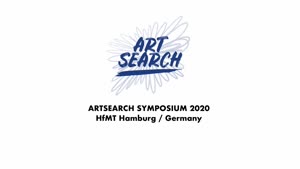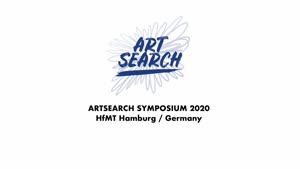Artistic Research - DAY 1 - HfMT Videoteam - HfMT
- MEDIATHEK
- Alle Videos
- HfMT
- HfMT
- ArtSearch Symposium 2020
Alle Videos
1615 Aufrufe
31.01.2020
Artistic Research - DAY 1
German Tóro Pérez
Taking time / giving space
Composition and performance practice of electroacoustic music in the age of artistic research
It may seem presumptuous to speak of an age in terms of artistic research. Nevertheless, with regard to the composition of elec- troacoustic music and its performance practice, practice-based research today produces new attitudes and new ways of thinkingand working. Although research in this field is as old as the artform itself, autonomous artistic research as it is understood, pro- moted and developed today marks a change in the relationship between art and society, which changes art practice itself - and its teaching. The lecture brings together observations of this transfor- mation, based on own projects, works and texts, and in particular questions the interrelationships between research, teaching and artistic practice. If artistic research has any merit, then it is above 5 all the time to think about phenomena beyond the constraints of the cultural industry and the appropriate spaces to examine these phenomena from a practical perspective and to make them understandable.
-----
Elise Schobeß
Artistic Research in Staging Music Theatre
In the field of music theatre and opera, artistic research is usually aimed at a work still to be created - often and specifically, the codification of formal research findings in a composition. Com- plementary to this is the process of performing the work, which so far seems to play little to no role in the compositional research project.
This can be for good reason. Due to the complexity of the dis- cipline, the practice of staging music theatre raises a number ofgenre-specific challenges. These include the involvement of a large number of different individual art forms, which together define theproduction; the role of the audience as an actor in the performan-ce process; and finally, the character of a production as a work,which is subject to its own, different criteria, due to its ephemeral nature.
Starting from discourses on performance analysis and performa- tivity, as well as performance philosophy, this lecture will addressthe specifics and resulting questions for artistic research, particu- larly in music theatre and operatic productions. Special attention is paid thereby to an analysis of dramaturgical working methods in the context of artistic research processes.
----
Prof. Dr. Jan Philipp Sprich | Roberta Vidic
Music Theory as Artistic Research – Methodological Problems and Perspectives
Music theory as a historical and current discipline combinespedagogical, artistic and scientific aspects. These aspects cannotbe separated and depend in their relative importance on the respective institutional situation of music theory. In Germany, due to the institutional embedding of music theory within a system of Musikhochschulen or universities of arts, the pedagogical and arti- stic aspects are more important than in the Anglo-American world, where academic music theory is located at music departments
at universities. But in respect of the potential of music theory for artistic research, the presence of German speaking music theory next to artistic production offers promising perspectives.
After a short introduction, where we will generally characterizeand model the current state of the discipline, we will discuss in three case studies methodological problems that arise, when music theory enters the realm of artistic research. The discussion of the pedagogical approach to music theory will focus on the aspect
of doing in basic teaching, that of the artistic approach on the potential of implicit knowledge in a close connection of analysisand interpretation. To differentiate, finally, between artistic and scientific research in music theory, a concept for ‘praxeological theory building’ will be introduced. Coming to emerging and inter-disciplinary fields of inquiry, the paper takes the challenge of field delineation after the ‘digital turn’ in music theory and research.
----
Prof. Dr. Simha Arom
The Contribution of Ethnomusicology to a Unified Musicology andContemporary Creation
Originating from „classical“ musicology, ethnomusicology, in its early stages, borrowed both its methods and its vocabulary from the mother discipline. The discovery of unsuspected musical idioms 7 and techniques ignored - or neglected - led this young discipline to forge new concepts, and also to revisit many of them. which wereconsidered definitively acquired, but which most often turned out to be polysemic.
As for contemporary creation: composers have always sought, consciously or not, to expand their language with new modes of expression, to which the world of orality can give them access, both in terms of basic materials (among which the diversity ofscales, of instrumental timbres, of rhythmic configurations), as wellas in terms of compositional techniques - such as various types of plurivocality, modalities of superposition of different periodicities, polyrhythmic combinations.
----
Paulo de Assis
On Artistic Research: Questions, Materials, Methodologies, Disse- mination, and the Role of Theory
What distinguishes artistic research from musicology, music theo- ry, and compositional or performative artistic practices? What isthe specificity of artistic research that makes it so interesting andappealing to a growing number of artists and musicians? What is the added value that artistic research brings to musical practice and to new knowledge production? In order to address these questions and supported by concrete examples, this presentation will focus on the kinds of questions posed in artistic research, on the materials used by musicians working in artistic research, on their methodologies, and on different modes of presentation and dissemination. Lastly, the role of theory in artistic research will bebriefly discussed.
----
Barbara Lüneburg
Worldmaking – Knowing through Performing
As a performing instrumentalist and artistic researcher, I am interested in the epistemology in performing practice. In my talk, I therefore set out to explore source and kind of knowledge perfor- mers produce, and investigate underlying methodological tools. I touch on different ways of the representation of research results and their dissemination, and pose questions about the conditions for knowledge gain through performance practice. In doing this,
I intentd to establish consciousness about the core practice and potential of performers with regard to knowledge contribution fortheir own specific instrumental practice and particularly within the field of artistic research and the humanities in general. I do thisout of the conviction that art and artistic research both are do-mains in which ‘the questions of the human being, consciousness,origin, and the subject emerge, intersect, mingle, and separateoff’ (Foucault 1972, 16)
Kapitel
-
 00:00:06German Tóro Pérez - Taking time / giving space Composition and performance practice of electroacoustic music in the age of artistic research
00:00:06German Tóro Pérez - Taking time / giving space Composition and performance practice of electroacoustic music in the age of artistic research -
 00:59:08Matthias Benjamin Helmer - Dr. sc. Mus. / KISS - Kinetics in Sound&Space
00:59:08Matthias Benjamin Helmer - Dr. sc. Mus. / KISS - Kinetics in Sound&Space -
 01:08:58Elise Schobeß - Artistic Research in Staging Music Theatre
01:08:58Elise Schobeß - Artistic Research in Staging Music Theatre -
 01:34:17Prof. Dr. Jan Philipp Sprich | Roberta Vidic - Music Theory as Artistic Research – Methodological Problems and Perspectives
01:34:17Prof. Dr. Jan Philipp Sprich | Roberta Vidic - Music Theory as Artistic Research – Methodological Problems and Perspectives -
 02:09:49Prof. Dr. Simha Arom - The Contribution of Ethnomusicology to a Unified Musicology and Contemporary Creation
02:09:49Prof. Dr. Simha Arom - The Contribution of Ethnomusicology to a Unified Musicology and Contemporary Creation -
 02:42:06Paulo de Assis - On Artistic Research: Questions, Materials, Methodologies, Disse- mination, and the Role of Theory
02:42:06Paulo de Assis - On Artistic Research: Questions, Materials, Methodologies, Disse- mination, and the Role of Theory -
 03:42:03Barbara Lüneburg - Worldmaking – Knowing through Performing
03:42:03Barbara Lüneburg - Worldmaking – Knowing through Performing







